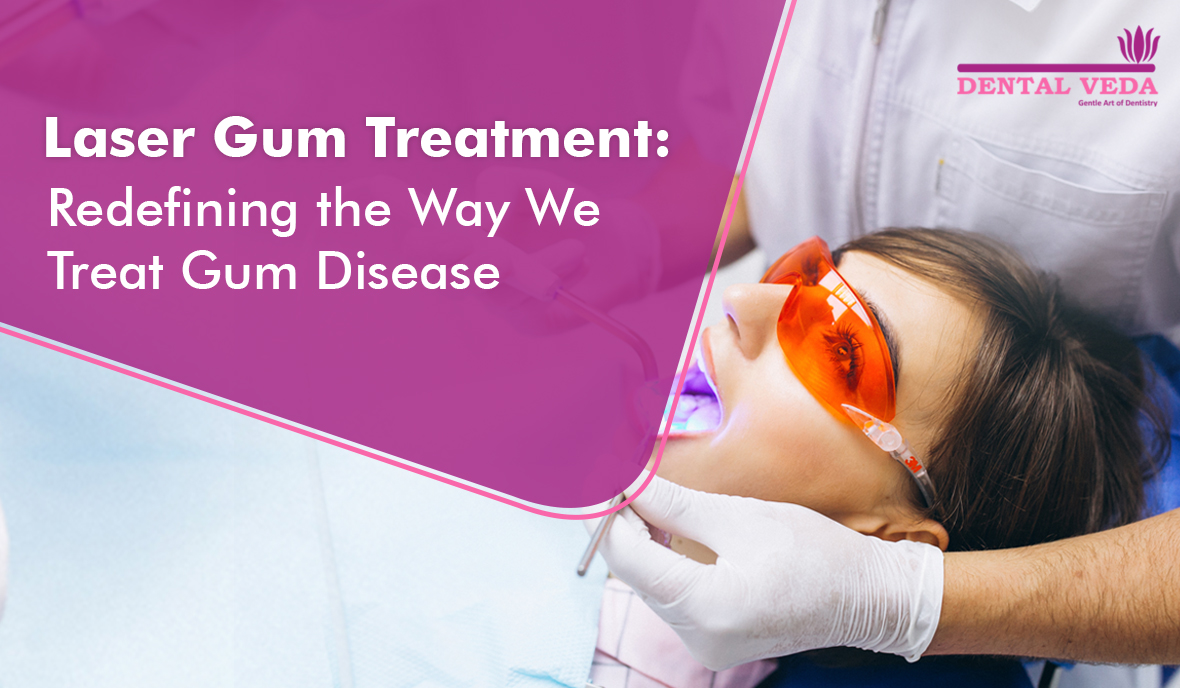Gum disease, also known as periodontal disease, is a common oral health condition that affects the tissues surrounding the teeth. It is characterized by inflammation and infection of the gums, which can eventually lead to tooth loss if left untreated. Understanding the nature of gum disease and its potential consequences is crucial for maintaining optimal oral health.
Definition of gum disease:
Gum disease refers to a range of conditions that affect the gums and supporting structures of the teeth. It typically starts with the buildup of plaque, a sticky film of bacteria that forms on the teeth. If not removed through regular brushing and flossing, the plaque can harden into tartar, leading to gum inflammation and infection. This condition progresses through different stages, from gingivitis, which is the early and reversible form of gum disease, to periodontitis, a more severe and irreversible stage.
Identifying the importance of treating gum disease:
Treating gum disease is of paramount importance for several reasons. Firstly, gum disease can cause significant damage to the tissues supporting the teeth, leading to tooth loss and the need for extensive dental interventions. Secondly, research has linked gum disease to various systemic health conditions, including heart disease, diabetes, and respiratory problems. By treating gum disease, individuals can reduce the risk of these complications and improve their overall health.
Overview of traditional gum disease treatments:
Traditional gum disease treatments typically involve non-surgical methods such as scaling and root planing, which aim to remove plaque and tartar buildup from the teeth and root surfaces. In more advanced cases, surgical interventions, such as gum flap surgery or bone grafting, may be necessary to repair and regenerate the damaged tissues. These treatments effectively manage and prevent gum disease when performed by skilled dental professionals.
Laser Gum Treatment: An Overview
-
- What is laser gum treatment?
Laser gum treatment is an advanced dental technology that utilizes concentrated beams of light energy to target and treat gum disease. It involves the use of dental lasers, which emit precise wavelengths of light that can selectively remove infected gum tissue and bacteria, promoting gum health and aiding in tissue regeneration. This innovative approach has gained popularity due to its precision, minimally invasive nature, and potential for improved treatment outcomes.
-
- How laser gum treatment works:
A dental professional uses a specialized dental laser to access and treat the affected gum tissue during laser gum treatment. The laser energy is directed toward the gum pockets and infected areas, where it selectively removes the diseased tissue while minimizing damage to the surrounding healthy tissue. The laser also has the ability to sterilize the treated area, eliminating bacteria and promoting a clean environment for healing. The laser can sometimes stimulate gum tissue regeneration and promote gum attachment to the tooth surface.
-
- Advantages of laser gum treatment over traditional methods:
Laser gum treatment offers several advantages over traditional gum disease treatment methods, including:
Precision and accuracy: The dental laser allows for precise targeting of specific areas, ensuring that only the infected tissue is removed while preserving healthy tissue.
Minimally invasive procedure: Laser gum treatment is generally less invasive than traditional gum surgery, as it involves minimal incisions and often eliminates the need for sutures.
Reduced discomfort and pain: Laser gum treatment is often associated with less post-operative pain and discomfort compared to traditional methods, as it involves minimal trauma to the gums and surrounding tissues.
Faster healing and recovery time: Lasers promote faster healing and recovery compared to traditional gum surgery, allowing patients to resume their normal activities sooner.
Improved long-term outcomes:Laser gum treatment has shown promising results in promoting gum tissue regeneration and reducing the likelihood of gum disease recurrence, leading to improved long-term oral health outcomes.
In the following section, we will further explore the benefits and potential of laser gum treatment in redefining the way we approach the treatment of gum disease.
Benefits of Laser Gum Treatment:
-
- Precision and accuracy:
Laser gum treatment offers exceptional precision and accuracy. The dental laser can accurately target and remove diseased tissue, leaving healthy tissue intact. This precision ensures that only the affected areas are treated, minimizing damage to surrounding healthy gums.
-
- Minimally invasive procedure:
Laser gum treatment is a minimally invasive procedure compared to traditional gum surgery. It involves minimal incisions and sutures, reducing the trauma to the gums and leading to a more comfortable experience for patients. The non-invasive nature of laser gum treatment also contributes to faster healing.
-
- Reduced discomfort and pain:
One of the significant advantages of laser gum treatment is the reduced discomfort and pain experienced by patients. The laser technology seals nerve endings and blood vessels during the procedure, resulting in less post-operative pain. Patients often report a significant decrease in discomfort compared to traditional gum surgery.
-
- Faster healing and recovery time:
Laser gum treatment promotes faster healing and recovery compared to traditional methods. The precise and controlled nature of the laser allows for minimal trauma to the gums, leading to quicker healing. Patients typically experience shorter recovery periods, allowing them to return to their normal routines sooner.
-
- Improved long-term outcomes:
Laser gum treatment has shown promising results in terms of improved long-term outcomes. The laser can effectively remove bacteria and diseased tissue, helping eliminate the infection source. Additionally, the laser stimulates gum tissue regeneration, promoting the reattachment of gums to the tooth surface.
The Procedure: What to Expect
-
- Initial consultation and evaluation:
The laser gum treatment process typically begins with an initial consultation and evaluation with a dental professional. During this visit, the dentist will assess your oral health, examine the condition of your gums, and determine if laser gum treatment is the appropriate course of action for you. They may also discuss your medical history and address any concerns or questions you may have regarding the procedure.
-
- Preparation for the laser gum treatment:
Before the laser gum treatment, your dentist will provide instructions on how to prepare for the procedure. This may include guidelines on fasting, medication adjustments, or specific oral hygiene routines. It is important to follow these instructions closely to ensure the best possible outcome.
-
- The laser gum treatment process:
You will be comfortably seated in the dental chair during the laser gum treatment. Your dentist will use a dental laser to target and treat the affected gum tissue precisely. The laser energy will be directed to remove the diseased tissue, promote gum regeneration, and eliminate bacteria. The procedure is typically performed under local anesthesia to ensure your comfort throughout the process.
-
- Post-treatment care and follow-up:
After the laser gum treatment, your dentist will provide detailed instructions for post-treatment care. This may involve recommendations for oral hygiene practices, dietary restrictions, and the use of prescribed medications or mouth rinses. It is crucial to follow these instructions diligently to aid in the healing process and optimize the treatment outcomes. (Provigil online) Your dentist will schedule follow-up appointments to monitor your progress, assess healing, and address any concerns that may arise.
Who can Benefit from Laser Gum Treatment?
-
- Patients with mild to severe gum disease:
Laser gum treatment is suitable for patients with varying degrees of gum disease, ranging from mild gingivitis to severe periodontitis. Whether you are in the early stages of gum disease or have advanced periodontal issues, laser gum treatment can effectively address the condition. Your dental professional will evaluate the extent of your gum disease and determine if laser gum treatment is appropriate for your specific case.
-
- Individuals seeking a less invasive treatment option:
Laser gum treatment offers a favorable alternative to traditional methods for those who prefer a less invasive approach to gum disease treatment. Laser gum treatment is considered a more comfortable and patient-friendly option with minimal incisions, reduced bleeding, and often no need for sutures. It allows individuals to undergo gum disease treatment with less trauma to the gums and a potentially quicker recovery time.
-
- Patients with dental anxiety or sensitivity:
Laser gum treatment can be particularly beneficial for patients who experience dental anxiety or sensitivity. The procedure is generally associated with less discomfort and postoperative pain compared to traditional gum surgery, making it a suitable choice for individuals who may feel anxious about dental procedures. The use of lasers can also minimize sensitivity during treatment, offering a more comfortable experience for those with sensitive gums.
Conclusion
Laser gum treatment has emerged as a transformative approach in the field of gum disease treatment. Its precision, minimally invasive nature, and ability to promote gum tissue regeneration make it a game-changer in oral healthcare. By harnessing the power of laser technology, dental professionals can provide patients with effective and comfortable treatment options for gum disease, revolutionizing the way we approach oral health.
Want to know more about the laser gum treatment? Book an appointment with Dental Veda, the best dental hospital in Gurgaon.
Frequently Asked Questions
How does laser gum treatment work?
Laser gum treatment involves the use of dental lasers, which emit concentrated beams of light energy. The laser is directed toward the affected gum tissue, targeting and removing the diseased areas while preserving healthy tissue. The laser energy can effectively eliminate bacteria, promote gum tissue regeneration, and encourage the reattachment of gums to the tooth surface. The procedure is typically performed under local anesthesia to ensure patient comfort.
Who is a candidate for laser gum treatment?
Candidates for laser gum treatment include individuals with varying degrees of gum disease, ranging from mild to severe. Laser gum treatment can be suitable if you have early signs of gum disease or more advanced periodontal issues. It is best to consult with a dental professional who can evaluate your specific case and determine if laser gum treatment is appropriate for your oral health needs.
How long does laser gum treatment take?
The duration of laser gum treatment can vary depending on the extent of the gum disease and the specific areas being treated. Generally, laser gum treatment is efficient and time-saving compared to traditional gum surgery. While each case is unique, the procedure itself usually takes a few hours or less. Your dental professional will provide you with a more accurate treatment time estimate based on your circumstances.
What are the benefits of laser gum treatment?
Laser gum treatment offers several benefits, including:
Precision and accuracy: The dental laser can precisely target and remove diseased tissue, leaving healthy tissue intact.
Minimally invasive: Laser gum treatment involves minimal incisions and often eliminates the need for sutures, resulting in less trauma to the gums.
Reduced discomfort: Patients typically experience less post-operative pain and discomfort compared to traditional gum surgery.
Faster healing: The precise nature of the laser promotes faster healing, allowing patients to resume their normal routines sooner.
Improved outcomes: Laser gum treatment has shown promising results in promoting gum tissue regeneration and reducing the likelihood of gum disease recurrence, leading to improved long-term oral health outcomes.
It is important to consult with a dental professional to fully understand the potential benefits and determine if laser gum treatment is the right choice for your specific oral health needs.


